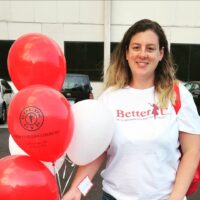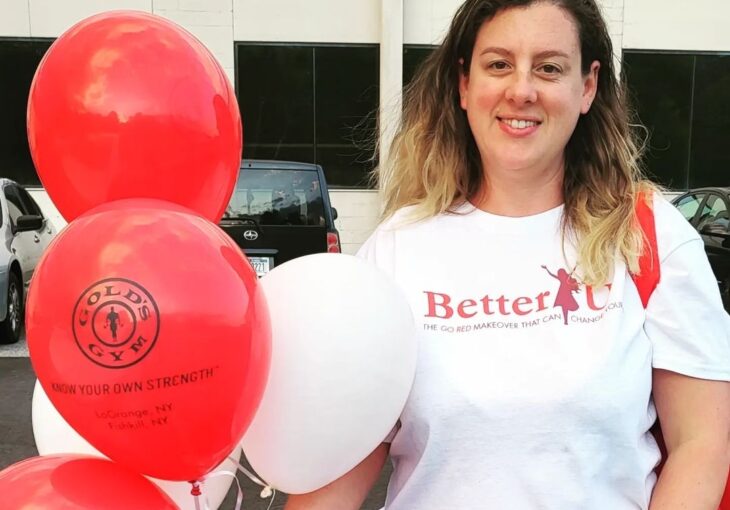
Jeanette Rodriguez’ blood pressure spiked during her pregnancy, leading to an emergency delivery.
Jeanette Rodriguez, a participant in the 2022 Hudson Valley BetterU class, had the perfect pregnancy when expecting her first child, now 8.
But at 32 weeks, her blood pressure “went crazy,” with the top number, the systolic number, going over 200. Her son was born nearly a month early, at 36 weeks, after a harrowing bout with pre-eclampsia.
“At that point in my life, I lived for work,” Rodriguez said. “I had always worked for large hotels, and I was the problem solver; the one who could de-fuse the unhappy customers.”
When she was 26 weeks pregnant, Rodriguez didn’t feel well after a visit with her sister on a Friday, and was about to lie down when her husband came home. He noticed that she didn’t look good, and Rodriguez said she wanted to go to the hospital.
“I just didn’t feel good,” Rodriguez said, “but I didn’t know what it was. Was it the pregnancy? Was it just a regular not-feeling-good? I didn’t know, but I knew something was wrong.”
At the emergency department’s triage, Rodriguez’ blood pressure was high, but she was told to go home and enjoy the weekend. But when she was getting changed, she vomited. When she told her doctor on the way out, her doctor immediately admitted her for a more thorough check.
With an IV running and hooked to monitors, Rodriguez noticed she couldn’t see the numbers on the machine, and then nothing at all.
“I think I’m blind,” she said. The high blood pressure was causing her brain to swell, resulting in blindness.
A team of doctors, including neurologists, were soon working with Rodriguez. Her systolic blood pressure was 210, and the bottom number was over 100.
“The only cure for pre-eclampsia is immediate delivery,” Rodriguez said, and the next step was a C-section under general anesthesia.
Because of the blindness, Rodriguez lost her sense of time. After the baby was delivered, he needed to go to the NICU, but a nurse stopped and let Rodriguez kiss her son.
Because both mother and baby were in intensive care units, Rodriguez couldn’t see her son for more than 24 hours.
“It wasn’t post-partum depression, but I felt disassociated from him,” she said. “Going blind was the most isolating feeling. It removed me from my birth story.”
When her vision returned – also in that time span – she had to be escorted into the NICU.
The first time she entered the NICU, she walked right past her baby.
“I was mad about that,” she said. “When I first held him, and saw him, I cried and cried. The tears just wouldn’t stop.”
It was a few months until the right combination of medication brought Rodriguez’ blood pressure down fully. In that time, she learned that she had a hole in her heart. A hole in the heart can let blood clots through, and travel to the brain, causing strokes.
Since the birth of her first son, when Rodriguez was 33, she has carefully had two other children.
“My doctor and I had a plan in place for the second baby, and I was on a low dose of aspirin throughout the pregnancy,” Rodriguez said.
She has dramatically altered her work life, working for 8 hours a week at home.
“I was career-driven,” she said. “I didn’t even want children for a long time. But then I met the love of my life, and we wanted kids together. I also wanted my children to have each other, and me. I want to be there for them, so I took a mental evaluation of what was important in my life, and those things had changed with not only the birth, but the traumatic birth of my son. I also carefully monitor my diet. I eat low salt, low fat, and I’m always on the lookout for anything potentially bad for heart health.”
During the BetterU program, Rodriguez felt palpitations, and had a check-up. She’s regularly monitored by a cardiologist, and discovered that the hole in her heart had closed, but she still experiences the palpitations from time to time. Her cardiologist continues to monitor her with regular ultrasounds.
Rodriguez is a survivor honoree for the Dutchess-Ulster Heart Walk, set for Saturday, April 29, at the Walkway Over the Hudson.
“I’d like to raise awareness about possible heart problems in pregnancy,” Rodriguez said of her reason for sharing her story. “I took every class imaginable when I was pregnant with my first son, and nothing prepared me for what happened. In a moment, my birth story, my whole world changed.”
For information or to donate to the Dutchess-Ulster Heart Walk, visit DutchessUlsterHeartWalk.org.
